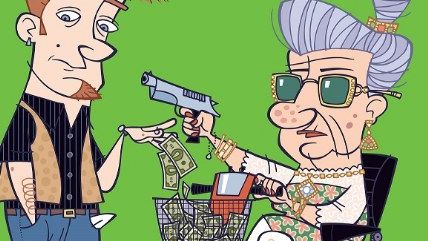The Middle Class Is Shrinking! Because They're Getting Rich!
Success is seen as a disaster when you care more about income inequality than mobility.

"The American Middle Class is Losing Ground," is the title of Pew Research Center's new report on income inequality. That headline informed the headlines that other media outlets have settled on as well. The Los Angeles Times states "Middle-Class families, pillar of the American dream, are no longer in the majority, study finds." The Washington Post declares "Income inequality has squeezed the middle class of the majority."
The headlines all appear to be accurate, but in that specialized newspaper way that attempts to reinforce an existing narrative and ignore some relevant information. It is true that Pew's analysis shows that the number of households that fit within their categorization of middle class has shrunk by 11 percentage points since 1971. It is true that the proportion of households that are classified as lower class has increased from 25 percent to 29 percent. But it is also true that the proportion of households that are classified as upper class has increased from 14 percent to 21 percent.
That is to say, part of the reason that the middle class is disappearing is that they are succeeding and jumping to the next bracket. And a greater number of them are moving up than moving down. Be wary of the assumption that the drop in the middle class is a sign of a crisis.
To be fair to Pew, their report in the very second paragraph points out this reality. It also points out that the increase in aggregate incomes to the highest tier of Americans is partly explained by the fact that there are more of them. Nevertheless there is the assumption that we are in some sort of a crisis because of inequality, even though the report notes an increase in incomes in all groups during this time.
The problem, not necessarily with the report but how we talk about it, is that there is very little consideration of income mobility. People look at that chart and assume that the people that are in each group remain in each group. Yes, it acknowledges that some in the middle class must be getting richer, but then some in the middle class must also be getting poorer, too. After all, the number of poor have increased as well.
But a look at the actual demographics of who is winning and losing from this shift gives a good sense of the reality of income mobility (and again, due credit, Pew doesn't shy away from examining it). Who are the demographic groups who have benefited the most from income inequality? Hint: It's not those Wall Street fat cats everybody is going on about. The top three beneficiaries of this income shift are: one, elderly people; two, married couples with no kids; and three, African Americans.
Yes, that's right, this decline in the middle class has actually helped some minorities. Blacks saw a net 11.2 percent increase in their aggregate participation in the upper class. In fact, whites, Asians, women, and men, all, as demographic groups, have seen positive economic mobility.
The big losers are Hispanics, millennials, and people with only high school diplomas (or none at all). For Hispanics, Pew notes the increase in lower-earning immigrants in the U.S. population. But we shouldn't perceive their situations as static. That they're coming to America poor shouldn't come as a surprise. Pew notes that when considered separately, both immigrant Hispanics and those born within the U.S. are also making gains.
As for those poor millennials, we know what's happening to them, and it's not the cruel vagaries of capitalism. It's the government! Note that the biggest beneficiaries of income inequality are the elderly. Pew notes "Evidence shows that rising Social Security benefits have played a key role in improving the economic status of older adults." But this comes at the expense of younger working class Americans, whose wages are being raided to bankroll the retirements of some of the wealthiest members of our citizenry.
If anything this report is not just an indictment of our entitlement system, but the way our rapidly increasing regulatory system robs the lower class citizenry opportunities for advancement and entrepreneurship. Those without college degrees getting left behind? Look at the spread of unnecessary occupational licensing, where the government itself is creating barriers for lower class employment by requiring unneeded fees and extensive training. It's gotten so bad even the White House has noticed. And when this current administration acknowledges that there is actually a problem with government regulation, it's worth noting.
But instead, we will likely see even more calls that the minimum wage be increased, even though that will probably actually lock out the folks who are at the bottom end of this totem pole even further. Given who is actually benefiting from these income shifts, maybe that's even the point.
